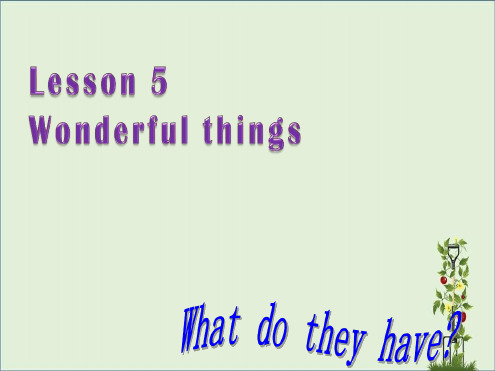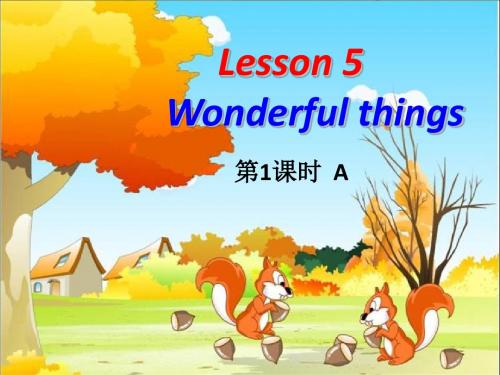最新牛津译林版预备教材Lesson5语言点知识讲解
- 格式:doc
- 大小:33.50 KB
- 文档页数:2


Unit5 知识点讲解及练习【课文讲解】e on, Eddie. It’s just a plane. I saw one yesterday.Come on --- 得了吧(表示知道某人说的话不正确时说的一种语气词)Come on --- 来吧, 赶快(用来催促对方)--- 加油(用于体育比赛等)----There is a snake on the road. ----Come on, Judy. It is just a rope.2.Fish sleep with their eyes open.with 作介词,意为“具有,带有”结构“with +名词+形容词/介词短语”在句中做伴随状语他喜欢关着窗子睡觉。
He likes _______ ________ the windows_______.我不喜欢开着灯睡觉。
I don’t like sleeping _________ the lights _________.fish --- 鱼(单复同形可数名词) fishes --- 不同种类的鱼fish --- 鱼肉(不可数名词) fish --- 钓鱼(动词) 3.Our eyes are the same size from birth, but our nose and ears never stop growing.same 形容词“同样的,相同的”the same as “与……相同”反义词组“be different from”意为“与……不同”birth n.出生,诞生at birth 出生时,from birth 从出生时birth还可以与部分名词构成合成词:birthplace 出生地;birthday 生日。
The girl called the woman mum from her birth.stop 停止stop doing sth. 停止做某事stop to do sth. 停下来去做另一件事Class begins. Let’s stop talking. After one hour’s walk, we stop to have a rest.4.The Sun is about 1,300,000 times larger than the Earth.time ---次数,倍数(可数名词) 复数timestime ---时间,时刻(不可数名词)比较级中表示“倍数”用“主语+…times +形容词或副词比较级形式+than…”once 一倍twice 两倍three times 三倍four times 四倍我们学校比你们学校大两倍。



牛津译林版七上Unit 5 知识点梳理1.Hobo, today is Halloween. 霍波,今天是万圣节前夕。
Halloween:n.“万圣节前夕(10月31日夜晚)”。
on Halloween “在万圣节前夕”。
2.Let’s celebrate. 让我们庆祝一下吧。
Let’s... = Let us...“让我们……吧”(加动词原形)。
celebrate:vi.“庆祝”。
celebration:n.“庆祝;庆祝活动”。
3.Have a guess! 猜一猜!guess:n./v.“猜,猜测”。
三单:guesses。
4.I want to dress up as a ghost. 我想装扮成鬼。
dress up as:“装扮成”。
dress up:“装扮,乔装打扮”。
dress up in:“穿上……打扮”。
辨析:dress/wear/put on/indress:vi.“穿衣”,宾语通常是人称代词或反身代词。
dress sb./oneself“给某人/某人自己穿衣服”。
get dressed:“给自己穿衣服”(= dress oneself)。
【表示动作】be dressed in:穿着……。
【表示状态】wear:“穿着”【强调穿的状态】,宾语通常是衣物。
put on:“穿”【强调穿的动作】,宾语通常是衣物。
in:“穿着”【强调穿的状态】,后接衣服、颜色。
5.That’s not very interesting. 那不太好玩了吧。
辨析:interesting/interestedinteresting:“有趣的;有吸引力的”。
作表语时,主语通常是物;作定语时,既可以修饰人,也可以修饰物。
interested:“感兴趣的,对……感兴趣”。
主语通常是人。
be/bee/get interested in...“对……感兴趣”。
lie learns about different festivals around the world. 米莉了解了全世界不同的节日。

最新牛津译林版英语7B Unit5 Amazing things知识点归纳整理Unit 5 Amazing Things1.Amazing refers to something that is XXX。
It can be used to describe objects。
while amazed is used to describe people who feel surprised。
Other similar adjectives include surprised and surprising。
excited and exciting。
interested and interesting。
and tired and tiring.2.Fish have the ability to sleep with their eyes open。
This XXX the structure "with + XXX n。
Other examples include "with the light on" and "with the door open." The opposite of "with" is "without," which can be used to indicate the absence of something.3.Our eyes remain the same size from birth。
but our XXX。
"The same size" means identical in measurement。
while "look the same" means appearing to be identical。
" doing something" means to cease an ongoing activity。
9. She thought herself a good birdwatcher .S V O OC宾补注意:1.宾语和宾补是主谓关系。
2.常带宾补的动词有make / keep / find / call / believe /think等。
e.g. The news made him unhappy .We should keep our classroom clean and tidy .I find him kind .10.The reserve gives wildlife an ideal home .S V IO(间宾) DO(直宾)注意:在英语中常跟双宾语的动词有:1.give / show/ send / pass/teach/bring sb sth= give / show / send/pass/teach/bring sth to sb2.buy/make/sing/draw/get sb sth= buy/make/sing/draw/get sth for sblittle …‟几乎没有‟‟与不可数名词连用.few “几乎没有”与可数名词连用.one of + 可数名词复数形式形容词变成副词的变化规则:①一部分形容词同时也是副词:e. g. long, early, fast②部分形容词和副词是两个完全不同的词:e.g. good--- well③一部分形容词本身就是以“l y”结尾,则不能再在词尾+“ly”,这时可用介词短语的形式来表示方式。
e.g. friendly, lively, lovely, lonely, likely④一些形容词不能变成方式副词:1.表语形容词:afraid, alive, alone, asleep2..表语, 定语形容词:difficult, fat, little, long⑤以辅音字母+“y”结尾的副词, 要先变“y”为“i”再+“ly”:⑥以“le”结尾的直接去“e”+“y”即可。
Unit 5一、语音1. y在单词末尾会发ar/: my fly by July sky try cry buy why goodbye butterfly2. y在单词词首会发/j/:you yellow yes year young3. y在单词末尾还会发/i/: hobby family sorry usually Billy Bobby reallyheavy body4. 特别小心,y和其他元音字母在一起,它们是字母组合,发音便不一样了。
如: ay/ei/ may way day Jay(人名) pay(支付)lay(放置)ey/ei/ they ey /ai/ eyeey/i/ monkey oy/ɔi/ toy boy joy(喜悦的)二、单词:1. teacher /’ti:tfə/ 老师2. teach /ti:tʃ/ 教3. write /rait/ 写4. work /w3:k/ 工作5. doctor /'dɔktə/ 医生6. help /help/ 帮助7. worker /’w3:kə(r)/ 工人8. nurse /n3:s/ 护士9. cook /kuk/ 厨师10. student /’stju:dnt/ 学生11. driver /’draivə/ 司机12. farmer /’fa:mə/ 农民13. writer /’raitə(r)/ 作家14. policeman /pə'li:smən/ 警察15. policewoman /pə'li:swumən/女警察16. people /’pi:p(ə)l/ 人;人们17. factory /’fækt(ə)ri/ 工厂18. sick /sik/ 生病的19. firefighter /faiəfaitə(r)/ 消防队员20. rea lly /’riəli/ 真的21. high /hai/ 高的22. why /wai/ 为什么23. sky /skai/ 天空24. butterfly /bʌtəflai/ 蝴蝶25. fireman /’faiəmən/ 消防队员26. cop /kɔp/ 警察27. parent /’pearənt/ 父或母28. relative /’relətiv/亲戚29. job /dʒɔb/ 工作30. end /end/结束三、词组:1. an English teacher 一位英语老师2. teach English教英语3. have a lot of students有许多学生4. write stories写故事5. work at home在家工作6. a new writer一个新作业7. help them帮助他们8.make cars制造汽车9. have a nice car 有一辆好看的车10. so many cars 那么多的汽车11.make sweets做糖果12. eat a lot of sweets吃许多的糖果13.an Art teacher一个美术老师14. two policemen两个男警察15. teach them English教他们英语16. two boy students 两个男学生17. help sick people帮助病人18.a factory worker 一个工人的工厂19. in the sky 在天空中20. see a butterfly 看到蝴蝶21. I wish 我希望22. in the US 在美国23. in the UK 在英国24. could fly 会飞25. in the high sky 在高高的天上26. your parents 你的父母27. talk about jobs 谈论工作28. your relatives 你的亲戚四、句型1.- What do you do? 你是做什么的?- I am a student. 我是一名学生。
Unit 5 Amazing things5.1 Comic strip&Welcome to the unit【要点梳理】1.词汇运用2.句子结构分析要点一:词汇1. amazing adj. 令人惊异的,惊人的区别amazing和amazedamazing 令人吃惊的,主语习惯上是物(事)。
如:Your success is amazing. amazed 感到惊奇(愕),主语习惯上是人,be amazed at....be amazed to do sth.【例】I was amazed at his answer. 我对他的回答感到十分震惊。
We were amazed to find her in the net bar. 我发现她在网吧,吃了一惊。
【拓展】以ing及ed结尾的相同用法的形容词还有surprising interesting e xciting frighteningsurprised interested excited frightened2.same adj. 同一的;相同的,同样的pron.同一事物;同样的人the same as 同……一样all the same 完全一样about the same 大同小异【例】We share the same social background. 我们有相同的社会背景。
They study in a same school.他们在同一所学校上学3. birth n.出生;分娩;起源;出身at birth 出生时by birth 生来,天生【例】She gave a birth to a girl.She weighed 5 pounds at birth.要点二:句子结构1.I saw one yesterday.我昨天还见过一架(飞机)。
one与it都可替代上文出现的某个名词,但用法不同。
one用来指代上文出现的某类事物中的一个(同类不同物)。
牛津译林七年级预备教材Lesson 5 语法知识点
1. Students bring their schoolbags to school.学生们都带着他们的书包上学。
bring “带来”把东西从远处带到近处,常和to放在一起用。
表示“把---带到---地方”。
下次来,把你的孩子带到我家来。
Next time, bring your child to my home.
2. All of the students have books--- 所用的学生都有书---。
all of +the+复数名词,表示“所有的---”。
所有的书都是新的。
All of the books are new.
所有的老师都来了。
All of the teachers come here.
3. Lily likes drawing. Lily喜欢画画。
like doing “喜欢做---”,表示“习惯性喜欢做什么”,已形成一种爱好。
我爷爷喜欢看报。
My grandpa likes reading newspaper.
Simon喜欢打篮球,他天天打。
Simon likes playing basketball, he play it every day.
4. It tells the right time. 它能报出准确时间。
时钟能“报出”时间,常用tell表达。
5. Nick and Peter do not have any football cards. Nick和Peter都没有足球卡片。
6. What’s the time? 什么时间了?常用来问时间,问几点几刻了?相当于:What time is it?
现在几点了?八点十分了。
What’s the time now? It’s eight ten.
7. 谓语动词的第三人称单形式。
当句子主语是第三人称单数时(He, She, It和单个的人名等),谓语动词要加s或es,加法同名词变复数。
他喜欢打篮球。
He likes playing basketball.
她每天带书包上学。
She brings the bag to school every day.
Lily每天帮助她妈妈做家务。
Lily helps her mother do the homework every day.
注意:have的第三人称单数形式是has。
Peter有一块手表。
我也有一块手表。
Peter has a watch. I have a watch, too.
他有一个新朋友。
He has a new friend.
练习:请把下列句子改为一般疑问句形式。
I like playing basketball.
Do you like playing basketball?
肯定答句:Yes, I do.
否定答句:No, I don’t.
My parents like cooking.
Do your parents like cooking?
肯定答句:Yes, they do.
否定答句:No, they don’t.
He likes playing basketball.
Does he like playing basketball?
肯定答句:Yes, he does.
否定答句:No, he doesn’t.
She brings the bag to school every day.
Does she bring the bag to school every day?
肯定答句:Yes, she does.
否定答句:No, she doesn’t.
Lily helps her mother do the homework every day.
Does Lily help her mother do the homework every day?
肯定答句:Yes, she does.
否定答句:No, she doesn’t.
Peter has a watch.
Does Peter have a watch?
肯定答句:Yes, he does.
否定答句:No, he doesn’t.
I have a watch, too.
Do you have a watch, too?
肯定答句:Yes, I do.
否定答句:No, I don’t.
He has a new friend.
Does he have a new friend?
肯定答句:Yes, he does.
否定答句:No, he doesn’t.
注意:当句子中没有is, am, are,情态动词时,就需要用助动词(do)来引导一般疑问句和构成否定句。
助动词就是用来帮助其它动词构成问句或否定词的动词。
8. There be+名词+地点“某地有某物”;have(has)“有”。
两者的区别:There be 表示某“地”有---;have(has)表示某“人”有---。
练习:翻译下列句子。
(1)树下面有一只猫。
There is a cat under the tree.
(2)我有一只猫。
I have a cat.
(3)树上有一些鸟。
There are some birds in the tree.
(4)Millie有一只鸟。
Millie has a bird.
(5)在我的铅笔盒里有一些铅笔。
There are some pencils in my pencil-box.
(6)我有一些铅笔在我的铅笔盒里。
I have some pencils in my pencil-box.
9. Is it new or old? 它是新的还是旧的?这个句子叫选择疑问句。
它不能用“Yes”或“No”回答。
必须选择其中的一个来回答。
---Is your bike new or old?
---It’s old. (---It’s new.)。